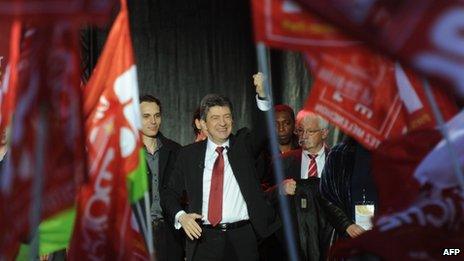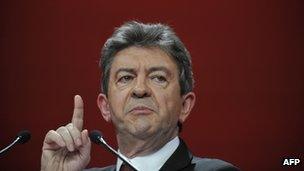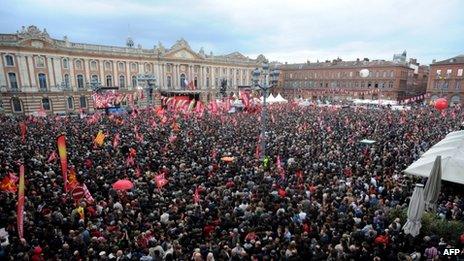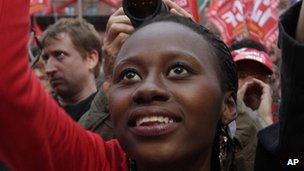Melenchon unites French hard left in presidential campaign
- Published

Jean-Luc Melenchon invokes the spirit of the French Revolution to unite the "left of the left"
The word "revolution" comes easy to Jean-Luc Melenchon.
The far-left candidate's campaign speeches are peppered with references to 1789, and calls for France to reconnect with the spirit of the Bastille.
If you believe his rhetoric, the whole of Europe is on the verge of a new popular insurrection, merely waiting for France to point the way.
"We're back - the France of revolution!" he tells a crowd of several thousand in the central French town of Vierzon.
"If Europe is a volcano - then France is the revolutionary crater!"
Melenchon is by turns vulgar, sarcastic and venomous.
He spits out contempt for his enemies (President Sarkozy, business, the far right, journalists), and fawns over the "people", loudly proclaiming France's mission as harbinger of the rights of man.
And always back to the Revolution.
"In a Revolution, there are no nice bits and nasty bits. It is a whole unto itself! Yes, there may be mistakes and failures - but oh, how marvellous, how glorious, how splendid, how extraordinary, how luminous a story for humankind!"
Radical left

Melenchon's supporters believe France's hard left will "vote with its heart" in the election's first round
There is a large-ish section of French society for which this kind of language touches a sweet spot.
It is the France that is not just on the left, but on the radical left, which believes change should be swift and, where necessary, painful.
In the past these people have voted for a variety of candidates: old-style Communists, Trotskyites, and ecologists.
But this year they have pulled off a trick of which they previously seemed incapable. They have united.
Today Jean-Luc Melenchon, a former Socialist minister turned fiery people's tribune, is polling at 15% of the vote for the first round of the presidential election.
He is now competing for third place with the far-right leader Marine Le Pen.
"We can feel the momentum building. He could easily make it through to the second round," says a campaigner worker in Vierzon.
If that outcome seems unlikely - President Sarkozy and the Socialist Francois Hollande are too far ahead - Melenchon can no longer be ignored.
Born in 1951 in Morocco, Melenchon was a member of a small Trotskyite group before joining the Socialists in 1977.
He served as a Senator, and for two years from 2000 as minister for professional education under Prime Minister Lionel Jospin.
In 2008, feeling that the Socialist Party was moving too far to the centre, he broke away to set up the Party of the Left (PG) which is now in alliance with the Communist party (PC) to promote his candidacy.
Since 2009 he has also been a member of the European parliament.
In alliance with the Communists, he can rely on their still-formidable campaign machinery but he also projects an appeal that goes way beyond their traditional constituency in the ageing working-class.

Melenchon's rallies draw huge crowds
"He has been able to unite several different factions," says Pierre Haski of the left-leaning news website Rue 89.
"Not just Trotskyists and Communists, but all the new generation of young anti-capitalists who were made so angry by the financial disasters of the last few years."
A big help is the other three candidates on the "left of the left". Where in the past there were charismatic leaders, this year's trio of Nathalie Arthaud (Worker's Struggle), Philippe Poutoux (New Anti-capitalist Party) and Eva Joly (Europe Ecology) are either invisible or inept.
But Melenchon also has an appeal among many Socialists.
"The reason why people will vote for me is that my programme reflects traditional left-wing values," Melenchon told me.
"We want pay-rises for the low-paid, retirement at 60 - demands which you won't find in Francois Hollande's manifesto, which is extremely bland, extremely consensual - and, to coin a phrase, extremely Blairite. Which, let me tell you, in France is not a compliment."
For many left-wingers, Melenchon speaks the kind of plain language that Hollande and the mainstream Socialists have avoided in their desperation not to alienate the political centre.
In the past, these people might reluctantly have decided not to vote for Melenchon, but to choose the mainstream Socialist out of fear of repeating 2002.

Melenchon has built an alliance of Communists, Trotskyites and anti-capitalists
This was the dread election, when the vote for the Socialist Lionel Jospin fell so low (thanks to other left-wing candidates) that he was overtaken by Jean-Marie Le Pen.
But the spectre of Marine Le Pen repeating her father's breakthrough has now faded. She is stuck on around 15%, with little chance of getting through to the second round.
There is therefore no problem for left-wingers to "vote with their hearts" this time.
Wider impact
Of course Melenchon will not win the election. It is almost inconceivable that he could even make it to the second round.
But if his vote goes even higher, to around 18 or 19% in the first round on 22 April, that may encourage Francois Hollande to veer to the left in between the two rounds.
And that could in turn deter centrist voters from voting for Hollande.
Certainly the right under President Sarkozy is seeking to highlight the threat that they say Melenchon poses to the Socialist.
By praising Melenchon as a "brilliant" orator who is making a clear contribution to the debate, the right draws a deliberate contrast with what they see as the do-nothing, say-nothing campaign of Francois Hollande.
But Melenchon is also building a big electoral bloc on the left, which - being viscerally anti-Sarkozy - will vote as one for Hollande in the second round.
Many of these voters will be traditional abstainers, or even National Front supporters won over by Melenchon's powerful rhetoric.
So his potential to damage the right is at least as powerful.
According to Haski, Melenchon's real influence will make itself felt after the election, if Hollande wins.
"In June there will be parliamentary elections. Hollande needs allies, so he will have to cut deals. Melenchon may oblige Hollande to be more left-wing than he otherwise might wish."
No one is quite sure what Melenchon really wants. Some say he is a bully and a narcissist, out to provoke.
Certainly he can come across as an ugly character.
He called me a "connard de journaliste" (a vulgar expression of abuse), merely for asking a question he did not like.
But on the other hand in the past he has shown himself willing to bargain in order to get into government.
For now he is basking in his moment of glory, and pumping up the revolutionary volume.
- Published4 April 2012
- Published19 March 2012
- Published26 March 2012